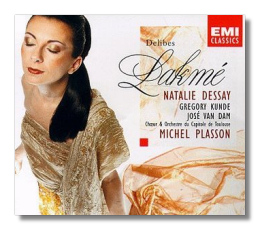
The Internet's Premier Classical Music Source
Related Links
- Delibes Reviews
- Latest Reviews
- More Reviews
-
By Composer
-
Collections
DVD & Blu-ray
Books
Concert Reviews
Articles/Interviews
Software
Audio
Search Amazon
Recommended Links
Site News
 CD Review
CD Review
Léo Delibes

Lakmé
- Natalie Dessay (Lakmé)
- Gregory Kunde (Gerald)
- José Van Dam (Nilakantha)
- Patricia Petibon (Miss Ellen)
- Xenia Konsek (Miss Rose)
- Bernadette Antoine (Mistress Bentson)
- Franck Leguérinel (Frederic)
- Delphine Haidan (Mallika)
- Charles Burles (Hadji)
Orchestra & Chorus of the Capitole de Toulouse/Michel Plasson
EMI Classics CDCB 56569 DDD 2CDs: 74:59, 68:56
There is a great deal more to Lakmé than the "Bell Song," so beloved by conceited coloraturas and their frenzied admirers. It's one of those operas that surprises you with the number of ear-catching melodies that it contains. It was premièred in 1883, and it was the last big hit for composer Léo Delibes, whose other successes were the ballets Coppélia and Sylvia. Lakmé is a variation on a popular theme - Eastern maiden falls in love with Western military man, then kills herself when he betrays her - whose operatic climax probably came with Madama Butterfly. However, today's Miss Saigon shows that there still is some juice to be squeezed from that papaya.
To the best of my knowledge, this is the fourth commercial recording of Lakmé to achieve general distribution. The first, recorded in the 1950s, featured the great French soprano Mado Robin, and that stylish London/Decca recording would be very welcome in a CD reissue, even if the sound is mono. More than a decade later, Joan Sutherland recorded it, also for London/Decca, and then Robin's successor Mady Mesplé made one for EMI. Each of these stereo recordings is on CD, and each has something to recommend it. This newcomer, apparently the first in 25 years, has the advantage of being the first in digital sound. It also has a largely charming cast and caring, knowledgeable conducting by Michel Plasson.
Natalie Dessay, a rising star, rejects the idea of a twittering and insipid Lakmé. Young in voice but mature in concept, she puts considerable effort into making the little priestess into a flesh and blood figure. Her "Bell Song," not just an opportunity for coloratura display, actually sounds like a narrative and a thoughtful bit of character development. Although her voice is not markedly distinctive, it certainly is ravishing. This is apparent right from the beginning: her invocation to "Blanche Dourga" (not a Tennessee Williams heroine) could convert the most hard-hearted infidel. One of Dessay's best tricks is a sudden diminuendo with no degradation in tone, and Delibes provides her with many occasions to use it.
As Gerald, the British officer who almost forgets his country and his fiancée (in that order) for Lakmé, Gregory Kunde is taxed but nevertheless makes a good impression with his sincere characterization. His Act One duet with Dessay is one of this set's highlights. The role requires a light, reedy tone with occasional powerful outbursts; Alain Vanzo and Charles Burles, Kunde's two immediate predecessors, reach their objective with less strain than Kunde, but they're all in the same ballpark. (Burles sings the small role of Hadji on this new recording.) José Van Dam, another veteran, sings the role of Lakme's father, Nilakantha. His somewhat frayed tone is forgivable, given the dramatic context, and he is moving in his paternal aria, "Lakmé, ton doux regard." Delphine Haidan's Mallika blends well with Dessay in the well-loved "Flower Duet," and the other Britons-in-India are lively in their Act One Quintet, and overall, they rest easily on the ear. No one quite approaches Monica Sinclair's broadly comic portrayal of the governess Mistress Bentson on the Sutherland recording, though. The orchestra and chorus find the right light touch for this fragile yet lovable score, and the recording engineers cooperate with well-balanced sonics.
Copyright © 1999, Raymond Tuttle


















